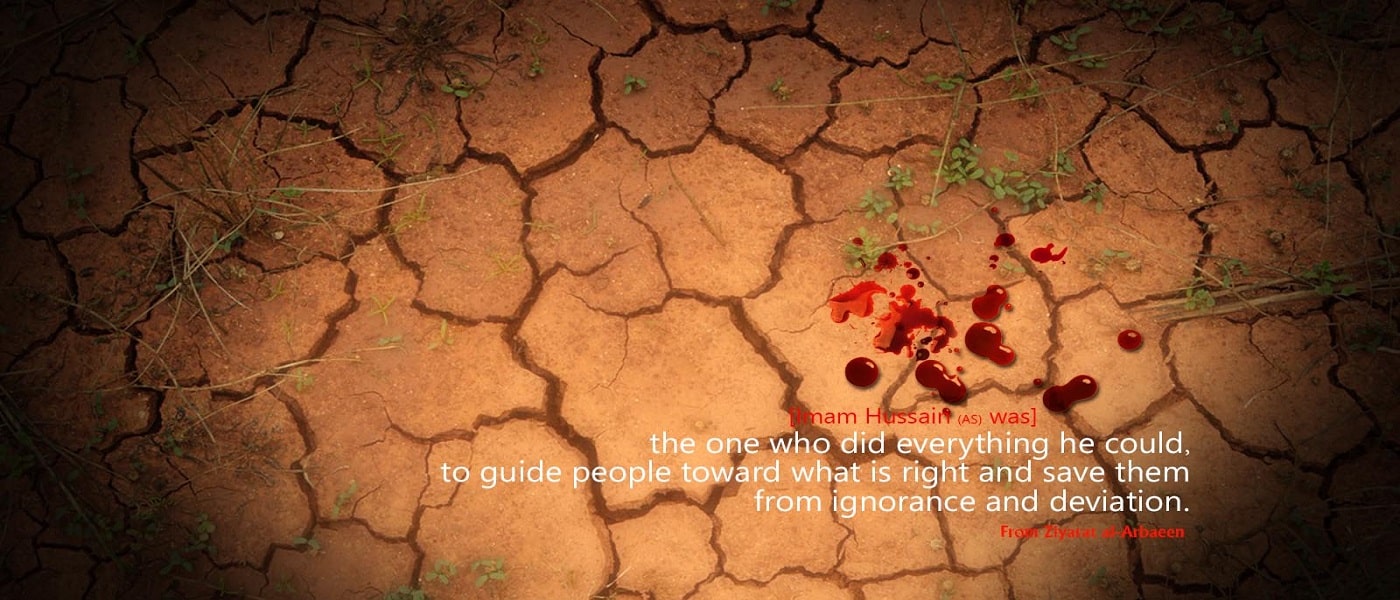

How Has Imam Hussain’s (AS) Uprising Inspired Humankind? Part 1
Imam Hussain (AS) is one of the important figures in Islam whose brilliant and lofty character together with his inspiring movement has been praised by many famous characters of the world. In this regard, Mahatma Gandhi said that: “My admiration for the noble sacrifice of Imam Hussein (AS) as a martyr abounds, because he accepted death ..., but did not submit to unjust authorities. I learned from Hussain how to attain victory while being oppressed.” [1]. Antoine Bara, a thinker, scholar, Christian and Syrian who wrote a book titled, “Imam Hussein in Christian ideology,” said that: “I am a Christian but call on humanity to follow the holiness of Imam Hussein as he is the conscience of all religions.” [2]. These quotes and others indicate that Imam Hussain (AS) is not an exclusive role model for Shi’a or Muslims, but belongs to the whole world. One might ask in what ways is Imam Hussain’s (AS) uprising an inspiration for human beings. We try to explain that through the following lines.
Imam Hussain (AS) Confronts the Oppressive Corrupted Regimes
Yazid’s reign was corrupted and illegitimate from the beginning. According to the peace treaty made between Imam Hassan (AS) and Mu’awiyah, the latter was forbidden to designate anyone as his successor after his death. But after the martyrdom of Imam Hassan (AS), Mu’awiyah broke the treaty. He appointed his son Yazid as his successor because he thought no one would be courageous enough to object to the decision of caliph. Hence, Yazid became caliph illegally after the death of Mu’awiyah [3]. Besides, according to historical resources, Yazid had a corrupted immoral character. He dared to act against Islamic rulings openly and perform forbidden deeds (Haram) in Islam publicly [3].
Imam Hussain (AS) was observant and aware of Yazid’s acts and intention. So, he refrained from pledging allegiance to Yazid. Moreover, oppression, tyranny, unjust use of public property, etc. had made life miserable for people [4]. Imam Hussain (AS) believed that Yazid’s manner and governing style was obviously against Islamic teachings and would eventually alter and spoil Prophet Muhammad’s (PBUH&PH) Sunnah. Hence, he stood up against Yazid to prove that his reign was illegitimate and to unravel the truth. Therefore, he (AS) said that he would never take the oath of allegiance to Yazid, even if there would be nowhere safe on the earth for him to go [5]. He never intended to take on the leadership and come to power, instead aimed at eliminating injustice and corruption.
Achieving Leadership, Not at Any Price
One might wonder why Imam Hussain (AS) did not pledge allegiance to Yazid to calm down his hostility so that he would have more time to make plans and find more companions to defeat Yazid. The reason was that Yazid’s behavior and deeds were too far from true Islamic principles and moral values such that Imam (AS) could not ignore them. Moreover, he (AS) did not want to play a trick as it is denounced in Islam.
Imam (AS) had other possibilities to defeat Yazid and take over the leadership, but he (AS) refused to do so. Through his missionary in Kufa, Muslim ibn Aqil, Imam (AS) could kill Ubayd Allah ibn Ziyad [i] before the battle of Karbala and before the enemy declared war against them. But, as a man who had stood up for justice, he did not act unfairly. Imam’s (AS) reaction was in the same manner as well; before the battle started when the enemy was fewer in number and easier to defeat, one of his (AS) companions recommended fighting them. He (AS) replied that he would rather defend if a war were imposed on him instead of initiating it. Moreover, when the enemy was impatient to start the battle, he (AS) did his best to prevent it by negotiating and bringing awareness to them by revealing the truth [4].
These examples demonstrate that Imam (AS) did not want to reign at any price; the same was true for other Infallible Imams (AS). This is of the traits of true divine leaders; unlike oppressive unjust powers. They never take the lead, whatever the cost.
Up to now, we found out about two reasons that make Imam Hussain’s (AS) uprising a worldwide inspiration. Firstly, one should be alert and sensitive to what happens around him\her. Then, to take the right action for the sake of justice and humanity. Secondly, even if one holds a noble intention, it does not mean that he\she is allowed to achieve that by any means; the end does not justify the means.
Imam Hussain’s (AS) movement has other lessons for human beings that we will discuss in the second part of this title.
Notes:
[i] The governor of Kufa during the reigns of Yazid, who executed Aqil, sent troops to intercept Imam Hussain (AS) when he arrived near Kufa and was one of the leaders of the battle against Imam (AS) in Karbala.
References:
- http://realiran.org/world-personalities-quote-imam-hussain/
- https://standwithdignity.org/article/antoine-bara-you-shia-do-not-appreciate-the-value-of-imam-hussein/
- https://www.al-islam.org/the-hidden-truth-about-karbala-ak-ahmed/chapter-13-muslim-empire
- https://salamislam.com/lifestyle/imam-hussain-embodiment-universal-moral-law
- M. Majlisi, “Bihar al-Anwar,” Dar Ihya al-Turath al-Arabi, Beirut, vol. 44, p. 325
Share This Article

What Are My Responsibilities towards Others? Part2
The responsibilities of a Muslim towards family, relatives and other Muslims in general, were already reviewed in an article. Here one's responsibility in Islam towards neighbors, friends, and enemies are discussed.
The Responsibility in Islam Towards Neighbors
Doing good to neighbors is highly emphasized in Islamic teachings: “Worship Allah and … be good to … the near neighbor and the distant neighbor” (4:36). Prophet Muhammad (PBUH&HP) advised Imam Ali (AS) to honor the neighbors, even if they are disbelievers (Kafir) [1]. Imam Ali (AS) said that Prophet Muhammad (PBUH) used to invite repeatedly to doing good to neighbors such that we thought he (PBUH) was going to consider an inheritance for them [2].
The rights of neighbors on one another as an important responsibility in Islam, are:
To honor them in their presence, and to help and care about them when they are absent [3]. It includes visiting neighbors when they are sick, to assist their funeral, and to offer them your tasty meals that smell good [4];
To keep their secrets. It means that not to look for their faults and errors. And, if ever you become aware of some of their faults, do not reveal them but try to conceal their deficiencies [3];
Do not leave neighbors alone in difficulties [3]; e.g., help them in case of financial needs [4];
Do not be jealous of them if God grants them some blessings [3];
Ignore their errors to yourself and forget about them. If ever they do wrong to you unintentionally, be patient and in peace with them [3];
Do not let others talk behind their back and reveal the deficiencies of your neighbors here and there [3].
Giving priority to the neighbors. It is narrated from Imam Hassan (AS) that Lady Fatima al-Zahra (AS) used to pray firstly for the neighbors and then for members of the family [5].
According to Imam Sadiq (AS), having good behavior and interaction with neighbors increases the provision (Rizq) [6]. Prophet Muhammad (PBUH) advised to respect neighbors as much as one should respect his\her mother [6] and he (PBUH) said: “God bless whoever does good to his\her neighbors” [7]. On the contrary, whoever sleeps peacefully at night while one of the his\her neighbors is hungry, God will deprive him of his blessings on the judgment day [8]. The same will happen to whoever annoys his\her neighbors [1].
Take your time and think about these attitudes towards the neighbors. Life will be surely much agreeable and peaceful if we improve our social interactions with our neighbors within the Islamic framework.
The Rights of Friends and Companions
Having a good companion is known as a blessing; on the contrary, a bad one is like a disaster [9]. Friends and companions have certain rights one over the other including:
To interact with them with generosity as much as you can, otherwise, be fair to them [3];
To be smiling when you meet them and to receive them modestly [3];
To respect them as they respect you [3];
To be the first one who does good to the other one, otherwise, try to compensate properly [3];
To help them in difficulties and whenever they are in need, as Imam Ali (AS) advised to [10];
To hold them in great affection according to Imam Ali (AS) [11];
Not to reveal their deficiencies and mistakes;
To encourage them in obedience to God and to prevent them from committing sins [3];
To be honest with them and not to cheat [3]; e.g., nor to talk behind their back neither to reveal their deficiencies and to guard their secrets;
To be trustworthy whenever they rely on you [3].
The Responsibility in Islam Towards the Enemies
The enemy here means a person whom one is in conflict with. There are some recommendations in Islamic resources on how to treat enemies and what is one's responsibility in Islam towards them:
To be fair with them [12]. According to Imam Sadiq (AS), a real believer (Mu'min) does not oppress his\her enemies [13];
To testify in favor of the enemies if they are right [14] even if your testimony is against yourself [3];
To keep the promises you made to your enemies [15];
To forgive and tolerate them, if possible [3]. According to Imam Ali (AS), there is a virtue in forgiving enemies [16];
To talk nicely and shortly with whoever you have complained of [3], to argue with them in a way that is best (16:125), and not to ignore their rights if ever you are wrong [3].
References:
- M. Shoueiri “Jami’ al-Akhbar”, p. 84.
- Shaykh al-Kulayni, “Al-Kafi”, vol. 7, p. 51.
- Imam Zayn al-'Abidin (AS), “Treatise On Rights (Risalat al-Huquq)”.
- responsibility towards others
- Shaykh al-Saduq, "Ilal Al-Shara'i", p. 181
- Shaykh al-Kulayni, “Al-Kafi”, vol. 2, p. 666.
- Shaykh al-Saduq, “Al-Amali”, p. 288.
- Shaykh al-Kulayni, “Al-Kafi”, vol. 2, p. 668.
- “Ghurar al-Hikam wa Durar al-Kalim”, T. 4719-4720.
- “Nahj al Balaqa”, p. 494.
- “Ghurar al-Hikam wa Durar al-Kalim”, T. 9665.
- Ibn Shu’bah, “Tuhaf al-Uqul”, p. 88.
- Shaykh al-Kulayni, “Al-Kafi”, vol. 1, p. 47.
- Shaykh al-Saduq, “Sifat al-Shia”, p. 24.
- “Nahj al Balaqa”, p. 53.
- “Ghurar al-Hikam wa Durar al-Kalim”, p. 435.
Read More

Is Cosmetic Surgery Allowed in Islam?
Being exposed to the ever-alluring representation of “A Perfect Body” in media through the picture of celebrities and actors, we inevitably grow more careful about our own body and try to compare ourselves with that unrealistic image that is made real for us. And the only remedy we find to get closer to that so-called norm is to change our appearances with the help of cosmetic surgeries.
Some people see a perfect correspondence between their physical features and inner confidence and instead of working on their inner abilities to elevate their character, try to make a better look. But there may be cases in which one is forced to undergo this kind of surgery out of necessity. What is Islam’s view about this matter on the whole? Are we allowed to have cosmetic surgeries or not? What are the conditions?
In what follows we will try to find the answers to these questions.
Islam’s View of Beauty
Beauty is a very relative concept and can at least be divided into two kinds: the beauty of the body vs. the beauty of the soul. In Islam, both of these aspects are given importance. However the latter is regarded as being superior to the former; Prophet Muhammad (PBUH&HP) says in a narration that, “Allah does not look at your faces but your hearts and deeds” [1].
The beauty of your character and the purity of your soul which is born with you and then can be elevated by following Allah’s guidance is far more valuable than your beautiful body. What gets you closer to Allah is your pious deeds, since: “…Indeed the noblest of you in the sight of Allah is the most God wary among you” (49:13).
Nevertheless, Islam is a religion that pays careful attention to the matter of personal hygiene and appearance. We have many narrations that emphasize this issue. For instance, Imam Sadeq (AS) always recommended his followers to “be neat and orderly, since Allah is beautiful and loves that which is beautifully provided that it is lawful (Halal)”[2].
As the best example of practicing Islamic teachings in its ideal form, prophet Muhammad (PBUH&HP) always appeared in his best shape both in society and at home and in this way showed Islam’s concern about the matter of appearance and outer beauty.
What Does Islam Say about Cosmetic Surgery?
Having said all of the above, the idea of beautifying yourself through cosmetic surgery remains unresolved. According to most Islamic jurists, having this kind of operation is not forbidden (Haram) in itself, provided that it is done for medical treatment such as removing a burn mark or curing a deformed part of the body [3].
However, undergoing cosmetics surgery just for the sake of beauty and without any purpose of medical treatment is only allowed if it is done by a doctor of the same gender since it is not out of necessity. This is because in Islam patients can refer to a doctor of the opposite gender, only when no same-gender doctor is available, or his proficiency is lower than a doctor of the opposite gender[3]. To have a better view of “Islamic Etiquette of Looking” as well as the matter of Mahrams, you can refer to the related articles.
Conclusion
It has been proved by many psychologists that having a better life, more often, is not related to your outward appearance; in other words, being beautiful does not necessarily make you happy. Instead, working on the inner beauty and elevating your soul leads you to a beautiful perception. However, this does not mean that Islam gives no importance to personal appearance and physical beauty. Prophet Muhammad (PBUH) always rejected the notion of abandoning worldly pleasures altogether in favor of a solitary and monastic lifestyle [i].
Notes:
[i] Prophet Muhammad (PBUH&HP) said: “ There is no monasticism in Islam” [4].
References:
- Mustadrak al Wassail, Vol 11, p. 264
- sul al Kafi , Vol 6 , p.442
- medical issue
- Na’aman Ibn Muhammad Tamimi Maqribi, Daaem Al-Islam, Egypt: Dar Almaaref ,Vol. 2, p.193
Read More

